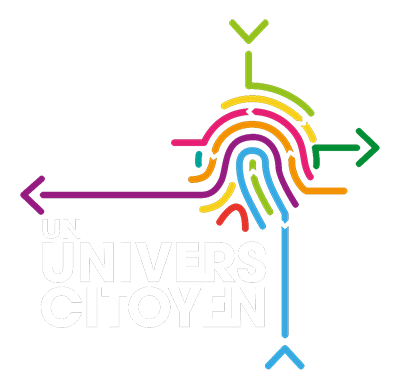**English translation below**
Du 8 au 10 mars, 12 animateurs et animatrices socio-éducatifs venues d’Italie, de France, de Grèce, du Luxembourg, et d’Espagne ont participé à une formation destinée à faciliter la prise en main et optimiser la diffusion de la mallette pédagogique “Questions de Migrations”.
Ces kits vous seront présentés en ligne le 9 avril. Les inscriptions sont ouvertes – in english please !
Pendant 2 ans, les partenaires associatifs et académiques du projet Erasmus + “Questions de Migrations” ont co-conçu 5 kits pédagogiques destinés à mieux comprendre les politiques migratoires européennes. La mallette étant terminée et déjà testée auprès de 363 jeunes européen·nes, il s’agissait désormais d’en faciliter la prise en main afin de répondre à un impératif partagé : optimiser sa diffusion en Europe.
Pourquoi ? Parce qu’en France et en Europe, des discours d’élites politiques et de médias de grande diffusion passent outre les résultats de la recherche sur les migrations et nourrissent des discours de haine à l’égard de la figure de l’immigré, en contradiction avec les valeurs de diversité et d’inclusion de l’UE. Les acteurs européens du secteur socio-éducatif le constatent au quotidien, il y a un besoin clair d’éducation et de sensibilisation aux réels enjeux migratoires à mener auprès du grand public, des médias, et des décideurs politiques. A l’heure actuelle néanmoins, l’éducation aux migrations est une niche que peu connaissent mais l’agenda des prochaines élections européennes nécessite qu’elle soit démocratisée.
Ainsi, la petite ville de Esch-sur-Alzette au Luxembourg, à quelques kilomètres de la frontière française, a réuni pendant trois jours 12 participant·es issu·es de milieux professionnels différents: étudiant·es en droit bénévoles auprès d’associations travaillant pour l’intégration des personnes migrantes dans leurs sociétés, professionnel·les du plaidoyer, éducateurs socio-éducatifs, étudiant·es en sciences sociales, professeur·es en collège etc.. Tous et toutes, déjà fortement engagé·es ou concerné•es par la question des migrations, ont souhaité participer à cette formation afin d’élargir leurs champs d’action et de s’outiller afin de pouvoir accompagner les jeunesses dans les enjeux européens actuels.
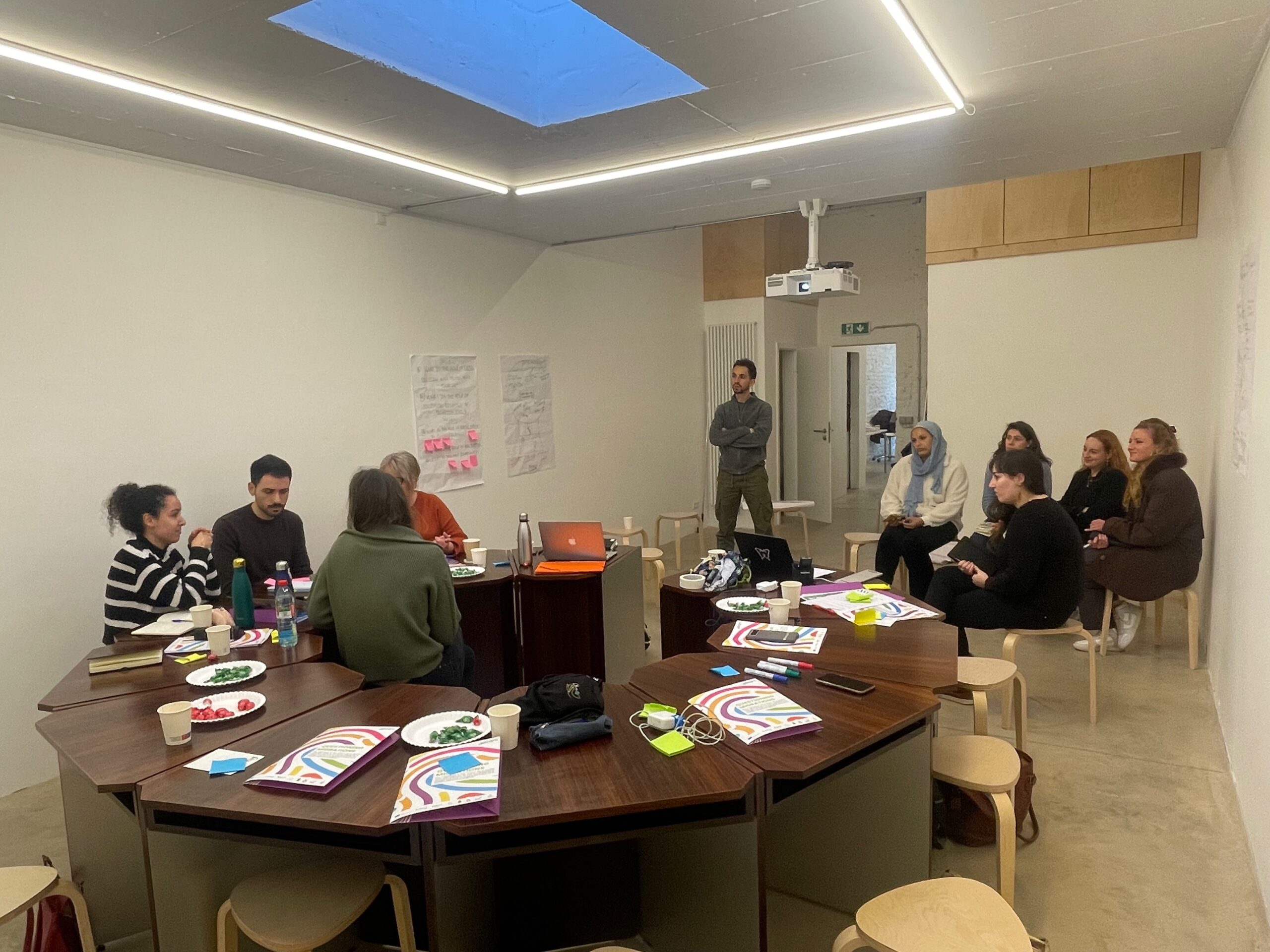
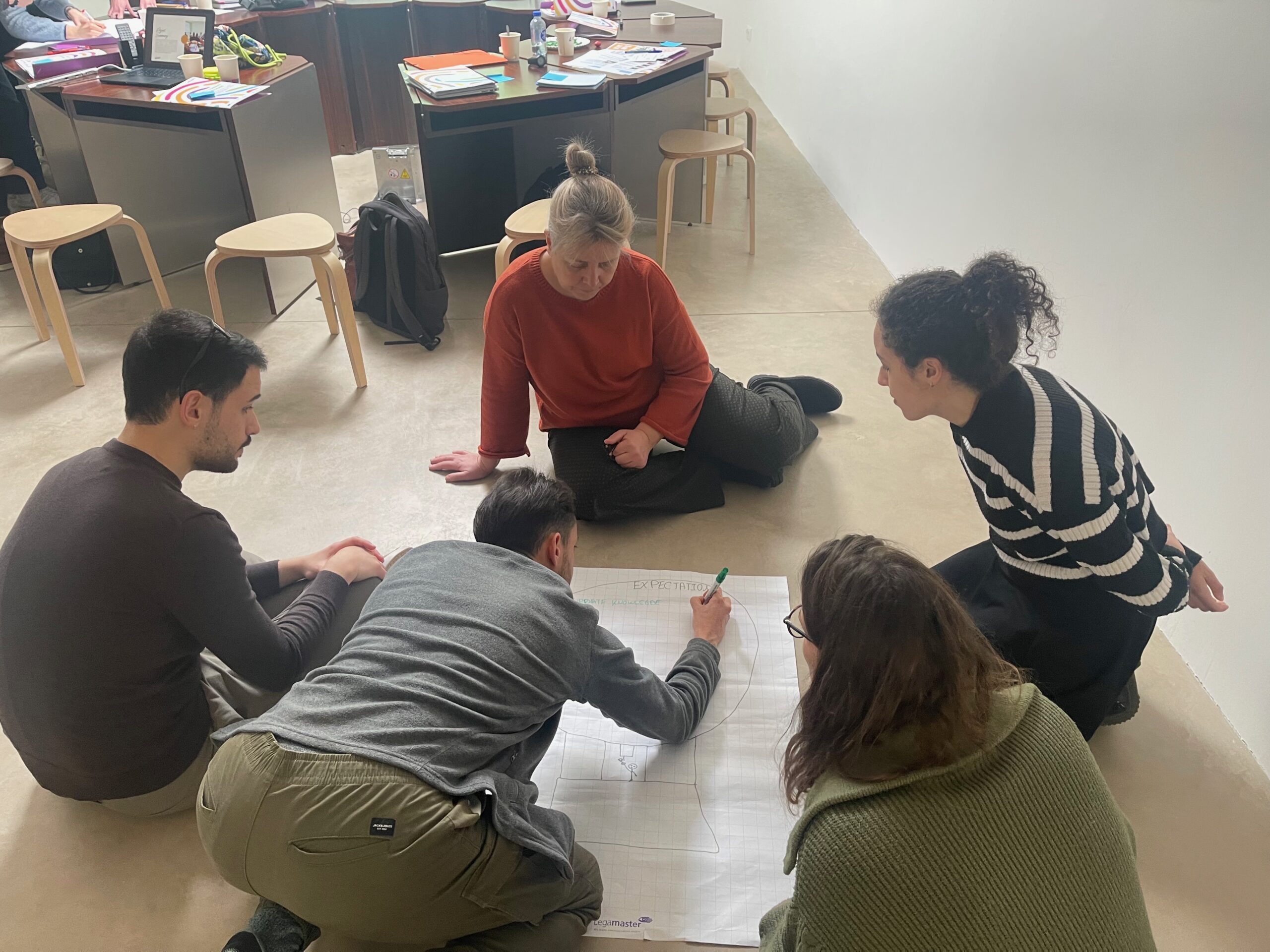
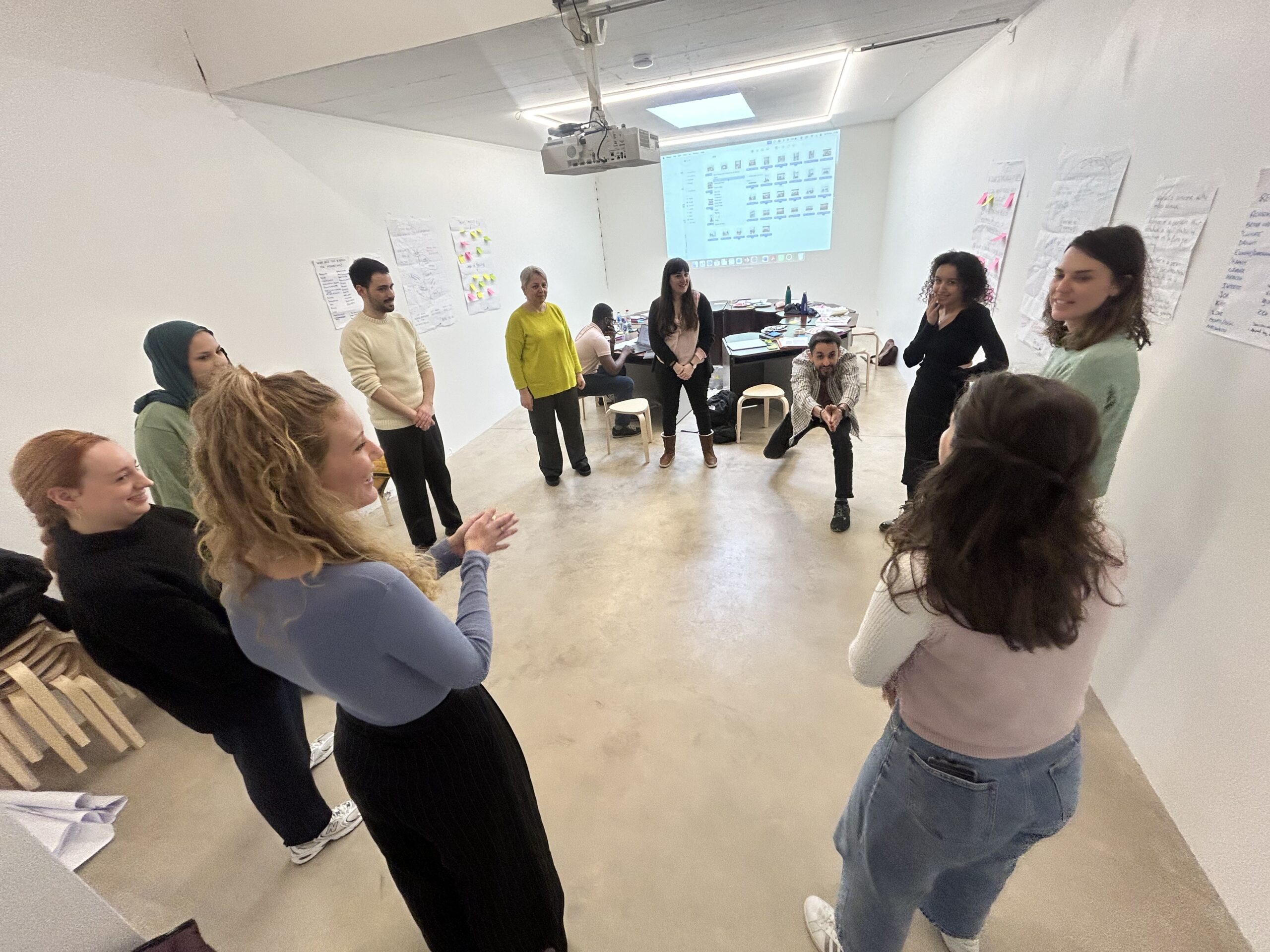
Le déroulé de la formation avait comme objectifs de leur permettre de s’approprier :
- la démarche du projet : à la croisée de réseaux de chercheurs et de réseaux associatifs européens
- le contenu pédagogique et thématique des 5 kits pédagogiques constitutifs de la mallette pédagogique
En complément, les participants ont été nourri de l’expertise thématique de Amalia Gilodi, spécialiste des politiques migratoires européennes et chercheuse à l’Université du Luxembourg. Elle a permis aux participants d’approfondir et renforcer leur maîtrise des enjeux et s’inscrit dans la démarche globale du programme d’éducation aux migration initié par e-graine qui s’emploie à décloisonner les savoirs académiques pour renforcer le pouvoir d’agir des citoyens.

La montée en compétences de professionnels se couple avec un volet citoyen et militant. A titre d’exemple, e-graine Nouvelle-Aquitaine, propose à de jeunes militants : des soirées citoyennes animées à l’appui de la mallette pédagogique. En (re)découvrant des sujets comme la procédure de Dublin, la Convention de Génève et des termes juridiques sur la politique d’asile en France et en Europe, ces espaces de débats ont permis aux participants d’exprimer leur rapport à la citoyenneté européenne et de croiser leurs regards sur un sujet complexe comme le fonctionnement de l’UE.
« Un moment chouette qui lie jeu, réflexion et engagement », témoignait Faidra Drakonaki, animatrice et référente du programme d’éducation aux migrations à la fin de l’atelier.
Ainsi, bien que les acteurs s’accordent à dire que les enjeux européens peinent à trouver leur public citoyen, les premières exploitations de la mallette pédagogique sont prometteuses ! La pédagogie active, qui part des représentations de chacun, permet de décomplexer les participants face à la complexité d’un sujet.
Ainsi “même” sur des enjeux européens, nos publics se sont révélés curieux et demandeurs de pouvoir approfondir les connaissances qui leur étaient proposées.
Cet enjeu sociétal est particulièrement fort alors que le calendrier électoral européen s’accélère. Si vous aussi vous souhaitez vous emparer de cette mallette, les partenaires du projet Questions de Migrations donnent rendez-vous en ligne le 9 avril de 17.30h à 19.30h CEST à la jeunesse pour participer à un atelier en ligne : formulaire d’inscription ici.
***
Dissemination of pedagogical tools covering the main challenges associated with the European migration policy
From 8 to 10 March, 12 socio-educational facilitators from Italy, France, Greece, Luxembourg and Spain took part in a training course designed to facilitate the acquisition and optimise the dissemination of the « Questioning Migrations » pedagogical kits.
These kits will be presented online on 9 April from 17.30 to 19.30, CEST.
Registration is now open :
https://docs.google.com/forms/d/e/1FAIpQLSeqe2rfEdg8L2z6M0qkXhoHMa_dlu6ija7LHioVewaYqB7weA/viewform
For 2 years, partners from associations and academia in the Erasmus + « Questioning Migrations » project have been cooperating on the design of 5 pedagogical kits aimed at providing a better understanding of European migration policies. Now that the kit has been completed and tested with 363 young Europeans, it is time to ensure that the material is accessible and enjoyable, so that it can be disseminated as widely as possible throughout Europe.
And why? Because in France and elsewhere in Europe, political elites and the mainstream media are ignoring the results of research into migration and fuelling hate speech about immigrants, in contradiction with the EU’s values of diversity and inclusion. As European socio-educational workers witness on a daily basis, there is a clear need to raise awareness and educate the general public, the media and political decision-makers about the major challenges of migration. At present, however, migration education is a niche with which very few are familiar, but the agenda for the forthcoming European elections requires it to be democratised.
For five days, the small town of Esch-sur-Alzette in Luxembourg, a few kilometres from the French border, brought together 12 participants from a wide range of professional backgrounds: law students volunteering with associations working to integrate migrants into their societies, advocacy professionals, socio-educational workers, social science students, secondary school teachers and so on. All of them, already actively involved or concerned by questions surrounding migration, wanted to take part in this training course in order to broaden their fields of action and equip themselves with the tools they need to help young people deal with the challenges facing Europe today.
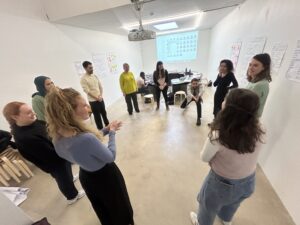
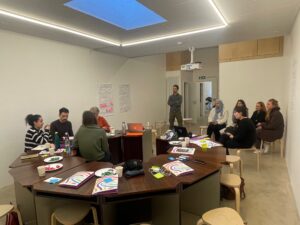
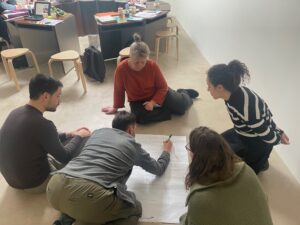
The objectives of this training course were to enable them to familiarise with :
– the project’s approach: at the crossroads of European networks of researchers and non-formal education associations
– the pedagogical and content-related themes of each of the 5 pedagogical kits that make up the toolkit.
In addition, participants benefited from the expertise of Amalia Gilodi, a specialist in migration policies in Europe and researcher at the University of Luxembourg. This enabled participants to deepen and strengthen their understanding of the issues at stake, and is part of the overall approach of the migration education programme initiated by e-graine, which aims to break down the barriers between academic knowledge and empower citizens.
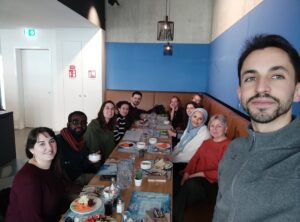 Skills development for professionals is combined with a civic and activist component. For instance, e-graine Nouvelle-Aquitaine offers young activists the opportunity to take part in workshops called “citizenship evenings”, where they use the pedagogical toolkit created in this project. By (re)discovering subjects such as the Dublin procedure, the Geneva Convention and legal terms on asylum policy in France and Europe, these debates enabled participants to express their relationship with European citizenship and to compare their views on a complex subject such as the workings of the EU.
Skills development for professionals is combined with a civic and activist component. For instance, e-graine Nouvelle-Aquitaine offers young activists the opportunity to take part in workshops called “citizenship evenings”, where they use the pedagogical toolkit created in this project. By (re)discovering subjects such as the Dublin procedure, the Geneva Convention and legal terms on asylum policy in France and Europe, these debates enabled participants to express their relationship with European citizenship and to compare their views on a complex subject such as the workings of the EU.
Faidra Drakonaki, facilitator and coordinator of the migration education programme in France said at the end of the workshop: « It was a great way to combine games, debate and civic engagement”.
Although all the actors involved agree that it is difficult to reach the general public when it comes to raising awareness on European challenges, the first results of the toolkit’s first deployment are very promising! The active educational approach, which builds on people’s own perceptions, helps to ease participants’ minds when facing up to the complexity of these subjects.
As a result, « even » when it comes to European affairs, our audiences have shown themselves to be inquisitive and keen to learn more about the issues being discussed.
This societal challenge is particularly important at a time when the European electoral calendar is accelerating. If you too would like to get to grips with this toolkit, the partners in the Questions de Migrations project are organising an online workshop for young people.
For more information, have a look our “call for participants” in SALTO-YOUTH :
